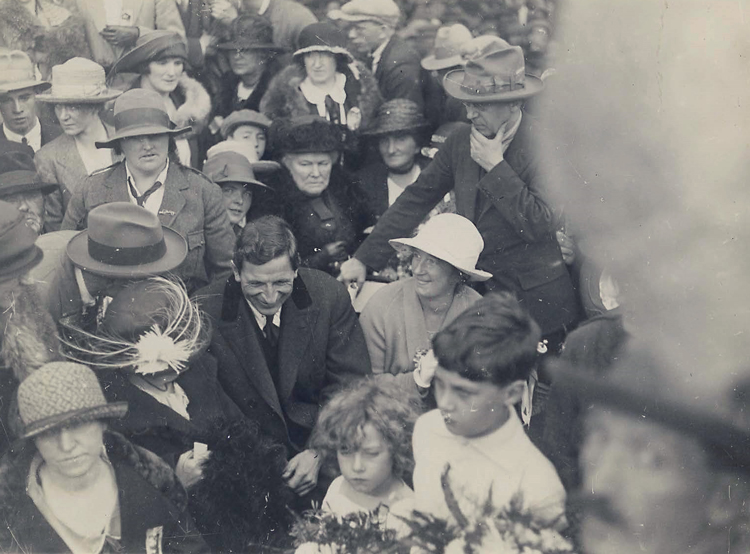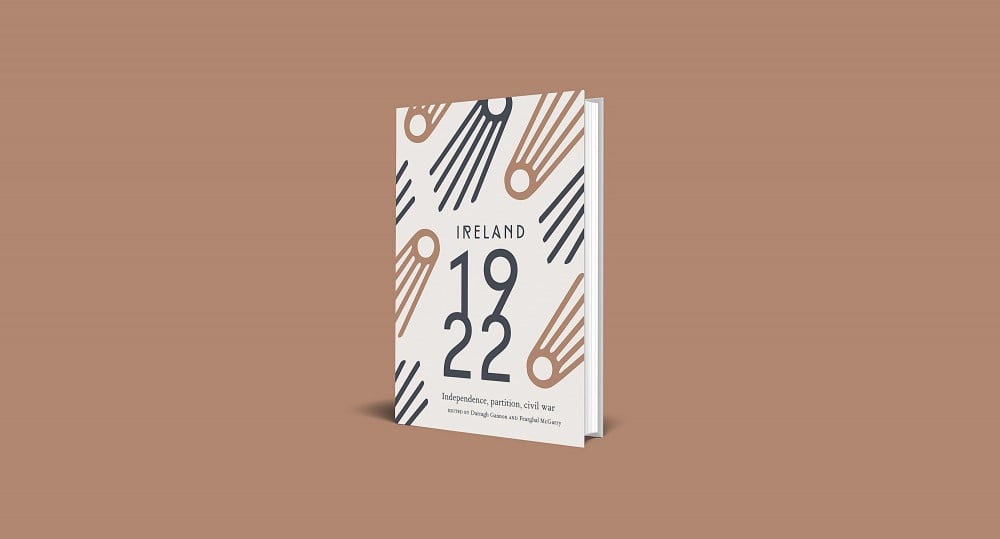17 March 1922: ‘Wading Through Blood’ in Thurles
Éamon de Valera’s Civil War
By David McCullagh
If the Volunteers of the future tried to complete the work the Volunteers of the last four years had been attempting, they would have to complete it, not over the bodies of foreign soldiers, but over the dead bodies of their own countrymen. They would have to wade through Irish blood, through the blood of the soldiers of the Irish Government, and through, perhaps, the blood of some of the members of the Government in order to get Irish freedom.¹
Was it a warning, or was it a threat? Éamon de Valera always insisted his speech in Thurles on St Patrick’s Day 1922 merely highlighted the dangers of the situation; his opponents accused him of inciting violence and raising the tension, which led to civil war.
The speech should not be seen in isolation—it was one of a series made during a tour of the south of the country, all delivering much the same message. De Valera told a crowd in Dungarvan that ‘it was only by civil war after this that they could get their independence’. In Waterford he claimed ‘the only choice left now was acceptance of the so-called Treaty or civil war’. In Killarney, the day after Thurles, he said that the Volunteers would have ‘to march over the dead bodies of their own brothers’ if they continued to seek full independence, adding, significantly, ‘and I hope they will continue’.²
Newspaper reaction was uniformly negative. His speeches were described as ‘amazing’ by the Freeman’s Journal and ‘wild’ by The Irish Times, while the Irish Independent accused him of using ‘the language of incitement’. De Valera dismissed the suggestion that he was inciting civil war as ‘villainous’. But Michael Collins was unconvinced: ‘They are incitements whatever may be his personal intention. Can he not strive to create a good atmosphere instead of seeking to create a bad one?’³
De Valera’s message was that political action would be incapable of removing the barriers he believed the Treaty placed in the way of an Irish republic. And if politics was doomed to failure, the inevitable result would be armed conflict.
His disillusionment with politics was understandable as he—up to then the unchallenged leader of Irish nationalism—had suffered a series of political defeats since the previous December. His attempt to control from Dublin the plenipotentiaries negotiating with the British had failed. He had been shocked to lose a vote in Cabinet on the resultant Treaty. And he had been rejected by the Dáil, first in a vote on the Treaty itself, and then again, more narrowly, in an effort to be re-elected president.
Moreover, his loss of control was accelerating. Not only was he now in the minority in the splintered national movement, but he was in danger of losing control even of the anti-Treaty side, as more militant and extreme voices sought to assert leadership. A few days after Thurles, Rory O’Connor, chair of the anti-Treaty IRA’s Acting Military Council, rejected the authority of the Dáil. ‘If a government goes wrong it must take the consequences...If the Dáil is the government of the country we are in revolt against it.’⁴
De Valera later admitted that his decision to support O’Connor in his ‘unfortunate repudiation of the Dáil’ had been ‘foolish’.⁵ He did so in an effort to avoid a split in republican ranks, which would further weaken the chances of defeating the Treaty (and, of course, further weaken his own position). That strategy meant, however, that he was no longer in a position to lead, but was instead handcuffed to the most extreme of the doctrinaire republicans.
The only way for him to regain control was to reassert the primacy of politics. He appeared to have done that when he agreed an electoral pact with Collins. Sinn Féin would put forward a panel of candidates representing both sides of the Treaty divide, with the promise of a coalition government to come. The pact looked like a victory for de Valera, but by allowing an election to proceed in relative peace, it actually became a defeat, because it meant ‘acceptance of the people’s decision as the final court’.⁶ He was under no illusion that the people favoured the Treaty, as they demonstrated in the election. The pact, and the political defeat to which it led, further undermined de Valera’s position with the radicals, who now had even more cause to ignore both his leadership and the verdict of the voters. The final eclipse of politics came with the shelling of the Four Courts on 28 June.
For a time, de Valera was eclipsed as well. While he served in various IRA staff positions, he came to believe that his true value to the cause lay in his political stature, which could be enhanced by establishing a republican government. Anti-Treaty chief of staff Liam Lynch at first rejected such a move, and became increasingly irritated by de Valera, particularly his calls for an end to the conflict. As early as August 1922, Lynch complained, deValera ‘was most pessimistic and regarded our position as hopeless’.⁷
De Valera hinted at this divergence of views when he secretly met Richard Mulcahy shortly after the death of Michael Collins. He said that while he was led by reason, others were led by faith, and as long as there were men of faith like Rory O’Connor setting the course, he would be ‘a humble soldier following after’.⁸ But he was following in what he believed to be the wrong direction.
The IRA Executive eventually agreed to the formation of a republican government under de Valera in October 1922, but there were strings attached. Recognition would depend on the new government sticking to the republican line, while the Executive retained final say on any peace deal that might be reached with the Free State.⁹ Trust in politics, and in de Valera, remained in short supply, and he remained very much second fiddle to Lynch in the republican band.
De Valera continued to argue unsuccessfully that continued resistance was futile. ‘To me our duty seems plain—to end the conflict without delay...The hope of success alone would justify our continuing the fight, and, frankly, I see no such hope...’¹⁰ But, the day after he wrote that letter, the situation was transformed by Lynch’s death in action. Six weeks later, on 24 May 1923, republicans were ordered to dump arms. Militarism had failed, and politics—and, therefore, de Valera—would in time regain primacy.
The civil war was the most miserable time of de Valera’s life; he was swept along by the course of events, deprived of the power to shape his own and the country’s destiny. He later complained: ‘I have been condemned to view the tragedy here for the last year as through a wall of glass, powerless to intervene effectively.’¹¹ He was in this position, of course, largely because of his own loss of belief in the political path, which left him a captive of extremists.
He had been proved right in his warning—or threat—of bloodshed in his Thurles speech. But his later career demonstrated that his underlying assumption was wrong. Politics could work, and could remove the restrictions to independence within the Treaty. Unfortunately, this demonstration came too late to prevent civil war.
Extracted from Ireland 1922 edited by Darragh Gannon and Fearghal McGarry and published by the Royal Irish Academy with support from the Department of Tourism, Culture, Arts, Gaeltacht, Sport and Media under the Decade of Centenaries 2012-2023 programme. Click here to view more articles in this series, or click the image below to visit the RIA website for more information.






















